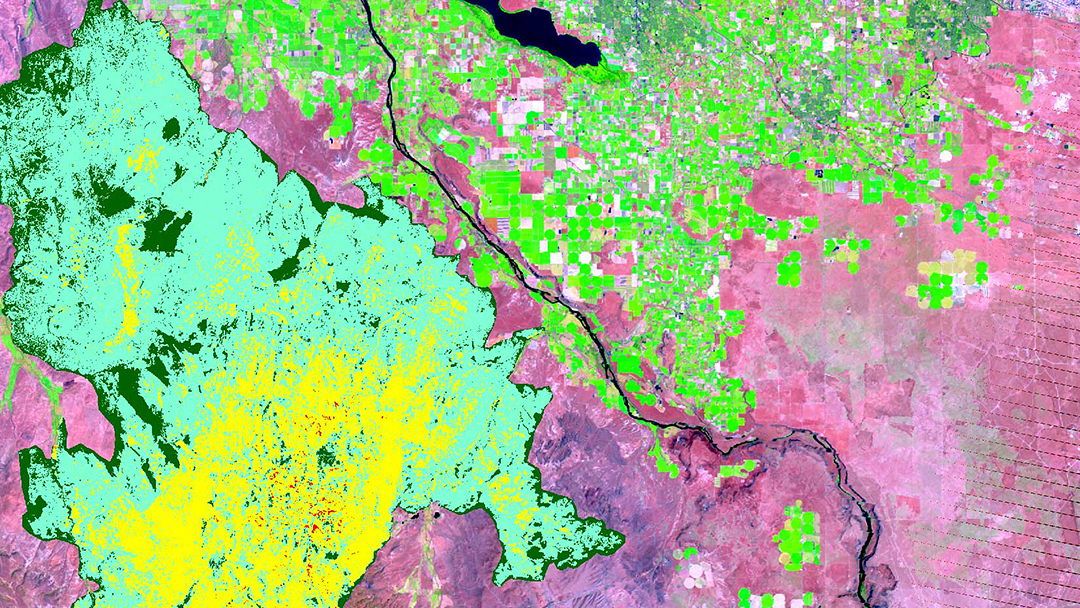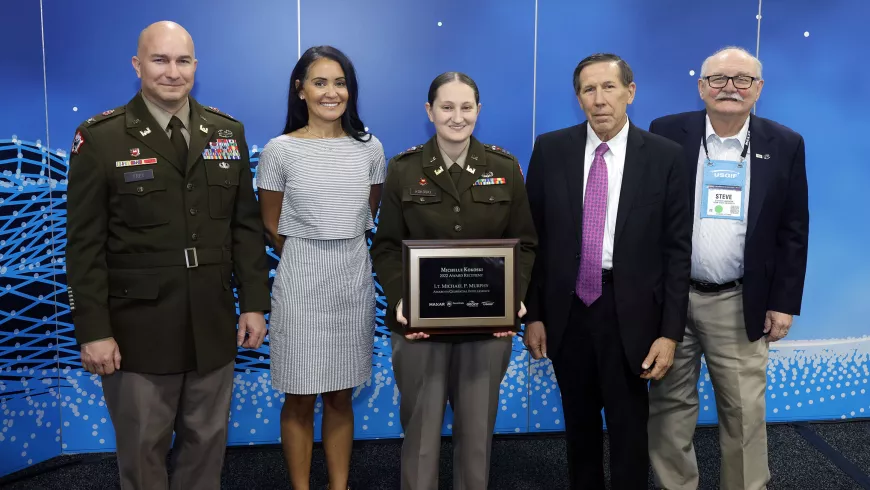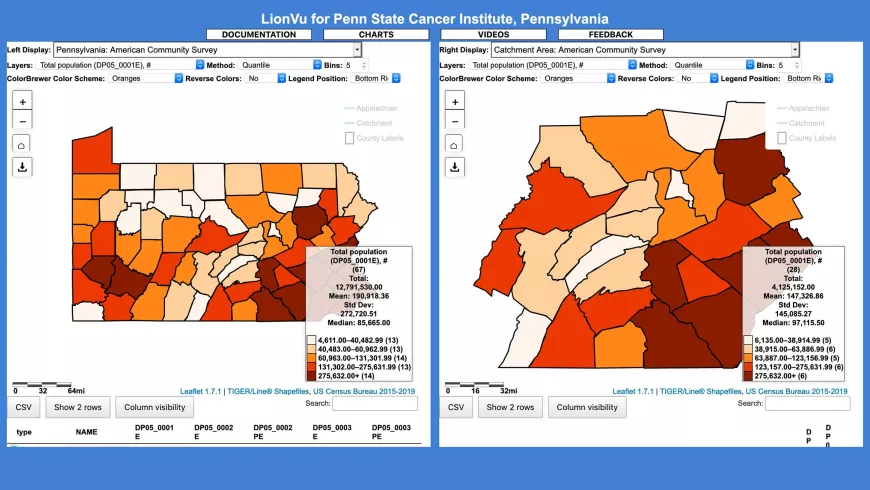100% Online
Complete your Penn State course work at your own pace and 100% online.
Application deadline
Credits and costs
10-Week Terms
Finish your program faster with accelerated 10-week terms.
Make Analytic Judgements about a Broad Spectrum of Problems
Integrate science, analytics, and the intelligence process to identify prominent threats to civil security.
Use geospatial data to address problem scenarios faced by the geospatial intelligence (GEOINT) professional.
Understand how GIS facilitates data analysis and communication to address common problems.
Apply and interpret results of non-quantitative analysis and modeling techniques.
Online Geospatial Intelligence Analytics Certificate Courses
Online Geospatial Intelligence Analytics Certificate Courses
Penn State’s GEOINT analytics courses focus not just on technical skills but also on the analytical knowledge necessary to apply those skills in the real world. The program's customizable curriculum is designed to address the needs of both the experienced practitioner and the novice analyst.
The 15-credit online GEOINT analytics certificate program can prepare you to use:
- critical thinking
- knowledge of human and physical geography and location
- problem-solving abilities
- geographic information technologies
These skills can be used to confront challenges related to national security, disaster response, resource preservation, business intelligence, and more.
As a student, you can learn to apply GIS tools and data analysis to gain insight into spatial-related problems and then how to effectively communicate and leverage your findings. Through improved intelligence reports, you may have a direct impact on critical decision-making within your organization. Depending on your background, you can take foundational courses or more advanced courses.
In the capstone course, you’ll apply what you have learned to complete a semester-long virtual field experience.
The five courses in the geospatial intelligence analytics graduate certificate program count toward Penn State's online Master of Geographic Information Systems or Master of Professional Studies in Homeland Security programs, should a student be accepted into one of these highly competitive master's programs.
The courses listed show a typical sequence. Actual courses taken will vary based upon technical experience and will be determined upon consultation with your faculty adviser.
Required Courses (select 15 credits)
- 3credits
The application of cultural geography in the intelligence analysis and synthesis process by identifying prominent threats to civil security.
- or:3credits
Orientation to the geographic foundations of geospatial intelligence and its applications in national security, international relief work, and disaster management.
- Note
This course is a prerequisite for all other courses in the certificate program and must be taken before enrollment in any of the other courses.
- 1credit
Culminating Experiences in current professional and ethical problems facing the geospatial intelligence professional.
- Prerequisite
All other courses in the certificate program must be successfully completed prior to enrolling in this course.
- or:1–3credits
Creative projects, including research and design, which are supervised on an individual basis and which fall outside the scope of formal courses.
- 3credits
Understanding remote sensing systems' operation, data products, and processing techniques to address typical problem scenarios faced by the GEOINT professional.
- or:3credits
Examines the nexus of geospatial intelligence analysis with cyberspace, the geopolitics of cyber threats, the politics of censorship and hacking, public safety, disaster response, and humanitarian relief; students will utilize a range of cyber data, systems, and spatial sciences to examine human social networks of the internet.
- Prerequisite
GEOG 882 and (GEOG 160 or GEOG 482 or permission of program)
- or:3credits
Using imagery and terrain data in typical application scenarios faced by the geospatial professional.
- 3credits
The course highlights the tradecraft of integrating spatial data science with geospatial intelligence methods; students practice this integration by preparing intelligence reports requiring GIS tools.
- or:3credits
How geographic information systems facilitate data analysis and communication to address common geographic problems.
- Prerequisite
GEOG 482
- 3credits
Focuses on the science and technology of human-machine collaboration using geospatial artificial intelligence (GeoAI) in GEOINT and the professional and ethical concerns that must be considered in this rapidly evolving field.
- Prerequisite
GEOG 882
Course Availability
If you're ready to see when your courses will be offered, visit our public LionPATH course search (opens in new window) to start planning ahead.
Start or Advance Your Career

Start or Advance Your Career
You can use the knowledge gained from this program and the support of Penn State career resources to pursue careers in a variety of fields, depending on your goals.
Job Titles Related to This Degree
More than 7,000 GIS and GEOINT professionals have turned to us to help them advance their careers. You can feel confident that you are adding a well-known, highly respected credential to your résumé.
Penn State's online certificate in GEOINT analytics can help start or advance your career as a:
- geospatial intelligence analyst
- midsenior-level geospatial intelligence analyst
- imagery analyst
- intelligence image analyst
- remote sensing scientist or technician
- remote sensing program manager
Career Services to Set You Up for Success

From the day you're accepted as a student, you can access resources and tools provided by Penn State World Campus Career Services to further your career. These resources are beneficial whether you're searching for a job or advancing in an established career.
- Opportunities to connect with employers
- Career counselor/coach support
- Occupation and salary information
- Internships
- Graduate school resources
Ready to Learn More?
Get the resources you need to make informed decisions about your education. Request information on this program and other programs of interest by completing this form.
Ready to take the next step toward your Penn State graduate certificate?
Costs and Financial Aid
Costs and Financial Aid
Learn about this program's tuition, fees, scholarship opportunities, grants, payment options, and military benefits.
Costs and Financial Aid
Graduate Tuition
Graduate tuition is calculated based on the number of credits for which you register. Tuition is due shortly after each semester begins and rates are assessed every semester of enrollment.
2025–26 Academic Year Rates
| How many credits do you plan to take per semester? | Cost |
|---|---|
| 11 or fewer | $1,037 per credit |
| 12 or more | $12,448 per semester |
Paying for Your Certificate
Students pursuing this certificate may be eligible for federal student aid. Find more information from the online geospatial education program office.
Additionally, Penn State offers many ways to pay for your education, including an installment plan and third-party payments. Penn State World Campus also offers an Employer Reimbursement and Tuition Deferment Plan. Learn more about the options for paying for your education.
Students pursuing a degree and meeting all other eligibility requirements may qualify for financial aid.
Military Benefits
Military service members, veterans, and their spouses or dependents should explore these potential military education benefits and financial aid opportunities, as well.
Additional Cost of Attendance Details
To view the detailed list of cost of attendance elements:
- visit the Tuition Information site
- click the plus sign to expand the table
- select a semester from the World Campus row
Technical Requirements
Review the technical requirements for this program.
A Head Start toward a Master’s Degree

A Head Start toward a Master’s Degree
Not only can this program help create opportunities in your career, it can also give you a solid head start toward a full master’s degree.
Continue Your Geospatial Education Online through Penn State World Campus
Some or all credits earned for this certificate may be applied to one of the following Penn State World Campus degree programs, should you apply and be accepted into the program:
Combine intelligence analysis with geospatial science and technology to gain situational awareness and provide a decisive advantage in preventing and responding to homeland security threats. This online degree program can help improve the accuracy of your organization's most critical intelligence assessments.
Learn more about the Master of Professional Studies in Homeland Security – Intelligence and Geospatial Analysis OptionThis online GIS master’s degree program can help you uncover insights and relationships to improve strategic decision making. Learn to apply industry best practices and the latest mapping tools to integrate, visualize, and interpret geospatial data. Customize your GIS degree program with 30 online courses.
Learn more about the Master of Geographic Information SystemsAccelerated Admission to an Online Master's Program
Accelerated Admission to an Online Master's Program
Any geospatial certificate student who earns a 3.67 grade-point average or higher after completing the first three courses of the certificate may qualify for accelerated admission to the Master of Geographic Information Systems, Master of Science in Spatial Data Science, or Master of Professional Studies in Homeland Security – Intelligence and Geospatial Analysis Option.
Advantages of accelerated admissions:
- no GRE test, professional experience, or letters of recommendation required
- admission decisions made on a rolling basis, year-round
Who Should Apply?
Whether you’re an experienced GEOINT practitioner looking to advance in your current role, an intelligence professional serving abroad, or a novice hoping to launch a career as a GEOINT or imagery analyst, this program is for you.
USGIF–Accredited

Penn State's online GEOINT analytics certificate program is fully accredited by the United States Geospatial Intelligence Foundation (USGIF). When you earn a certificate in GEOINT analytics from Penn State, you will also receive a certificate from the USGIF.
Take Advantage of Flexible Course Scheduling
Take Advantage of Flexible Course Scheduling
The GEOINT certificate program operates on five 10-week terms. With two terms that partially overlap in fall and spring, and one term in the summer, you are provided with the greatest flexibility possible in completing your degree at your preferred pace.
You can choose to schedule your courses without any overlap or take as many courses as possible to finish sooner.

Registration for most courses begins three months before the start of the course. Given the limited number of seats available in our courses, early registration is strongly encouraged.
It is strongly recommended that students take only one course during each of the five terms.
Earn Your Certificate in One Year
Whether you are looking to finish your program as quickly as possible or balance your studies with your busy life, Penn State World Campus can help you achieve your education goals. Many students take one or two courses per semester.
Convenient Online Format
This program's convenient online format gives you the flexibility you need to study around your busy schedule. You can skip the lengthy commute without sacrificing the quality of your education and prepare yourself for more rewarding career opportunities without leaving your home.
A Trusted Leader in Online Education

Penn State has a history of more than 100 years of distance education, and World Campus has been a leader in online learning for more than two decades. Our online learning environment offers the same quality education that our students experience on campus.
Information for Military and Veterans

Are you a member of the military, a veteran, or a military spouse? Please visit our military website for additional information regarding financial aid, transfer credits, and application instructions.
How to Apply to Penn State

How to Apply to Penn State
Apply by August 1 to start August 13
Application Instructions
Deadlines and Important Dates
Complete your application and submit all required materials by the appropriate deadline. Your deadline will depend on the semester you plan to start your courses.
Fall Deadline
Apply by August 1 to start August 13Spring Deadline
Apply by December 15 to start January 7Summer Deadline
Apply by April 15, 2026, to start May 18, 2026
Steps to Apply
For admission to the J. Jeffrey and Ann Marie Fox Graduate School, an applicant must hold either (1) a baccalaureate degree from a regionally accredited U.S. institution or (2) a tertiary (postsecondary) degree that is deemed comparable to a four-year bachelor's degree from a regionally accredited U.S. institution. This degree must be from an officially recognized degree-granting institution in the country in which it operates.
To pursue the certificate in geospatial intelligence analytics, you must be admitted by two Penn State organizations:
- Penn State Fox Graduate School
- Penn State Department of Geography
You will need to upload the following items as part of your application:
Official transcripts from each institution attended, regardless of the number of credits or semesters completed. Transcripts not in English must be accompanied by a certified translation. If you are a Penn State alum, you do not need to request transcripts for credits earned at Penn State but must list Penn State as part of your academic history.
English Proficiency — The language of instruction at Penn State is English. With some exceptions, international applicants must take and submit scores for the Test of English as a Foreign Language (TOEFL) or International English Language Testing System (IELTS). Minimum test scores and exceptions are found in the English Proficiency section on the Fox Graduate School's "Requirements for Graduate Admission" page. Visit the TOEFL website for testing information. Penn State's institutional code is 2660.
Test Scores — GRE test scores are NOT required.
To begin the online application, you will need a Penn State account.
Create a New Penn State Account
If you have any problems during this process, contact an admissions counselor at [email protected].
Please note: Former Penn State students may not need to complete the admissions application or create a new Penn State account. Please visit our Returning Students page for instructions.
You can begin your online application at any time. Your progress within the online application system will be saved as you go, allowing you to return at any point as you gather additional information and required materials.
- Choose Enrollment Type: "Certificate Admission"
- Choose "WORLD CAMPUS" as the campus
Checking Your Status
You can check the status of your application by using the same login information established for the online application form.5. Complete the application.
Admissions Help
If you have questions about the admissions process, contact an admissions counselor at [email protected].
Contact Us

Contact Us
Have questions or want more information? We're happy to talk.
Our program specialists are available now to help you with your application and to answer any questions you have about our online geospatial programs. Please contact us with anything you wish to discuss.
Julene Santiago
Geospatial Portfolio Program Assistant
Penn State College of Earth and Mineral Sciences
[email protected]
Phone: 814-865-2557
To see more detailed information about the geospatial portfolio, visit the program website within Penn State's College of Earth and Mineral Sciences. You can also visit Penn State’s Repository of Open and Affordable Materials (ROAM) to preview some of the geospatial courses offered online by the Department of Geography.
For general questions about Penn State World Campus, please contact:
World Campus Admissions Counselors
Phone: 814-863-5386
[email protected]
Learn from the Best
Learn from the Best
The Graduate Certificate in Geospatial Intelligence Analytics is offered in partnership with Penn State’s College of Earth and Mineral Sciences. Penn State's online geospatial education program has been a trusted leader in online education since 1998.
Faculty
Anthony C. Robinson, Ph.D.
- DegreePh.D., Geography, Penn State
- DegreeM.S., Geography, Penn State
- DegreeB.S., Applied Geography, East Carolina University
Dr. Anthony C. Robinson, professor of geography, serves as the director of online geospatial education at Penn State. He is also the faculty director for the GeoGraphics Lab in the Department of Geography and former president of the North American Cartographic Information Society (NACIS). Dr. Robinson is a cartographer who designs and evaluates geovisualization tools to improve geographic information utility and usability. He has worked in epidemiology, crisis management, national security, and education domains to develop and evaluate new methods for visualizing spatial data.
James Detwiler
- DegreeM.S., Geography, University of Delaware
- DegreeB.S., Earth Science, Penn State
James Detwiler is in a 100% teaching appointment and specializes in GIS programming. He teaches GEOG 485: GIS Programming and Automation; GEOG 863: Web Application Development; and GEOG 868: Spatial Database Management. His research interests are in the areas of applied GIS and climatology.
Fritz Kessler
- DegreePh.D., Geography, University of Kansas
- DegreeM.S., Geography, Penn State
- DegreeB.S., Geography, Ohio University
Dr. Fritz Kessler's teaching interests include cartography, geographic visualization, map projections, spatial analysis, land surveying, geography of health, and statistics. His research interests include map projections, geographic visualization, history of cartography, and cognitive cartography.
Karen Schuckman
- DegreeM.S., Geographic Information Systems, Penn State
- DegreeB.A., Liberal Arts, Penn State
- DegreeB.S., Meteorology, Penn State
Karen Schuckman's teaching and research interests include applications of airborne and spaceborne remote sensing to topographic mapping, land-use/land-cover analysis, positional accuracy assessment of remotely sensed base map data products, and other geospatial applications.
Gregory Thomas
- DegreePh.D., Administration and Leadership Studies, Indiana University of Pennsylvania
- DegreeMPA, Penn State
- DegreeB.S., Criminal Justice, Shippensburg University of Pennsylvania
Dr. Gregory Thomas has experience developing intelligence for decision-makers, supervising the analytical process, and providing team guidance. He also has experience teaching intelligence and analytical techniques to college students as well as intelligence analysts and law enforcement personnel. He has developed operational intelligence to support criminal investigations and anti-terrorism activities, and has selected, trained, and supervised analysts in a criminal intelligence center. His teaching and research focus on geospatial intelligence analysis, homeland security, and criminal intelligence.
News







